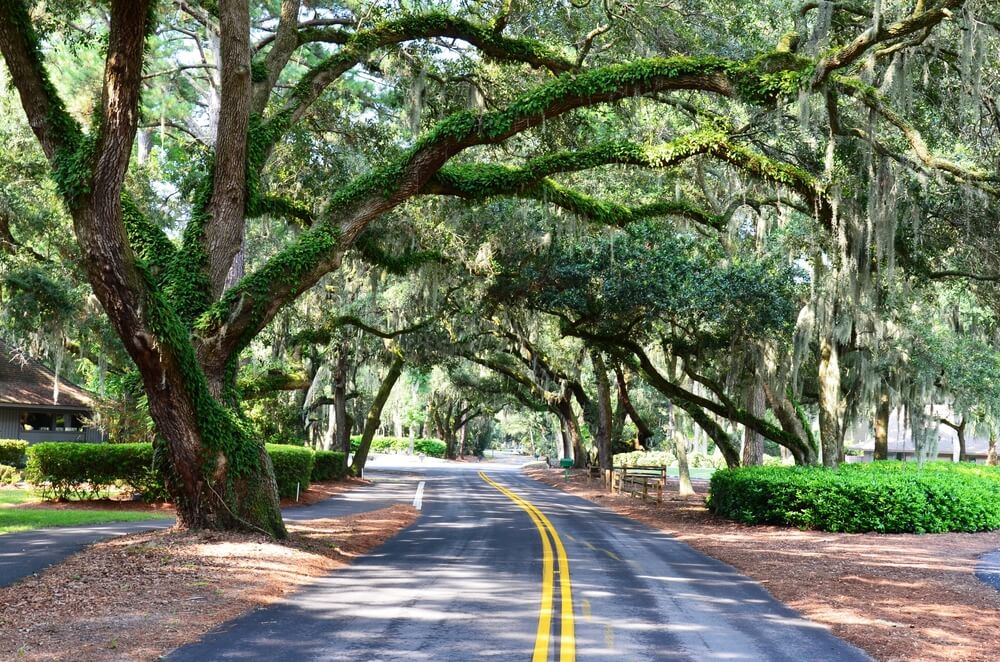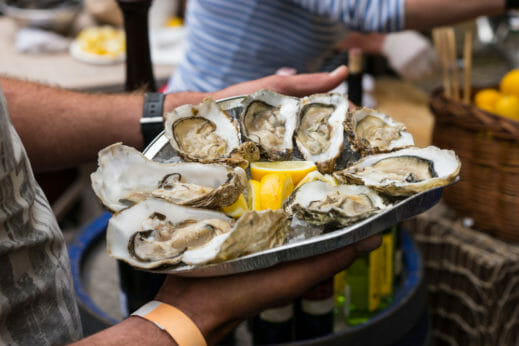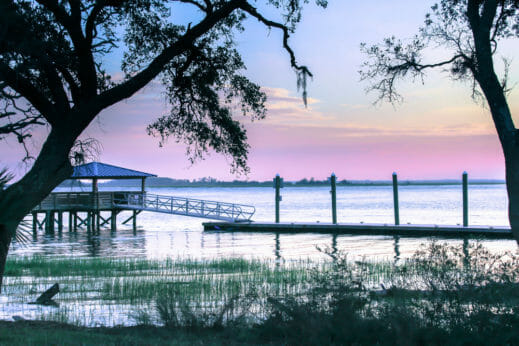A Late Winter Getaway in South Carolina’s Lowcountry
Off-season crowds are light in this subtropical slice of America, but the culinary charms are always heaped on deep.
A Late Winter Getaway in South Carolina’s Lowcountry
Off-season crowds are light in this subtropical slice of America, but the culinary charms are always heaped on deep.

Hilton Head Island is a great place for a road trip during March break.Jwwaddles / Shutterstock
Lowcountry, roughly speaking, is the stretch of coastal islands and backwater swamps that run from Charleston, South Carolina, south to Savannah, just across the Georgia border. These historic cities are overflowing with enchantment, but the region is perhaps best known for the white sands of Hilton Head Island and the throngs of tourists who create Los Angeles–level traffic jams from spring break to Labor Day weekend.
But here in the coastal Deep South, T-shirt weather runs year-round. It’s not quite warm enough for swimming in winter, but it’s perfect for beachcombing, with miles and miles of empty sand to explore. It’s also the ideal season to discover Lowcountry culture and cuisine.
Winding through the back roads, you’re almost guaranteed to stumble across a shacky café, where you can experience an authentic Lowcountry “boil,” a spicy, slow-simmered stew of shrimp, crab, sausage, potatoes and corn. It’s a place to encounter farms that you won’t find anywhere else — the region is home to a renaissance in heirloom rice — and the meandering rivers and coastal wetlands are a birder’s paradise that are easily accessed with a rented kayak. Massive, low-hung oak trees, dripping with Spanish moss, lend an almost mystical vibe to the landscape.
Perhaps the most magical aspect of Lowcountry are the locals. This is the ancestral home of the Gullah, descendants of slaves who have maintained their traditional dialect, spiritual practices and foodways, even as gaudy tourist development has spread like rhizomes all around them. Here and there, you’ll find Gullah restaurants offering their unique take on barbecue and gumbo. One must-stop is The Gullah Grub Restaurant on St. Helena Island (once featured on Anthony Bourdain’s No Reservations), which sources organic heirloom rice from a farm run by chef Bill Green and his family.

Just a few miles inland from Hilton Head, Bluffton is the artsy, foodie place in Lowcountry. Long before it got hip, the town revolved around the local oyster industry, which continues to thrive. Harvesting wild oysters is no longer sustainable, but local outfits like the Bluffton Oyster Company and May River Oyster Company practice an eco-friendly brand of oyster farming. Oysters, shucked and served on the half-shell minutes after harvesting, are in season in the off-season, from September to April.
In colonial times, farmers in this part of the country attempted to grow Camellia sinensis — the source of both green and black teas — for export to England. The only tea plantation remaining today is on Wadmalaw Island, just south of Charleston. Though it is now owned by the Bigelow family and operated as a tourist attraction, it remains a functioning farm committed to organic practices. Take a tour with farm manager Bill Hall, a third-generation professional “tea taster.”

Tourist development has been slow to arrive on Daufuskie Island, which has remained an outpost of traditional Gullah culture, because it lacks road access from the mainland. But that’s starting to change as resorts sweep in and ferry service from Hilton Head, Bluffton and Savannah makes the island readily accessible. There is a winery, rum distillery and cooperatively managed organic farm, but one of Daufuskie Island’s best-known attractions is a woman named Sallie Anne Robinson, a sixth-generation Gullah resident, celebrity chef and cookbook author. She offers twice-weekly tours of her homeland, enlightening visitors to the vibrant interplay of land, food and culture that she grew up with.
Follow us
This work is licensed under a Creative Commons Attribution-NoDerivatives 4.0 International License.
Want to republish a Modern Farmer story?
We are happy for Modern Farmer stories to be shared, and encourage you to republish our articles for your audience. When doing so, we ask that you follow these guidelines:
Please credit us and our writers
For the author byline, please use “Author Name, Modern Farmer.” At the top of our stories, if on the web, please include this text and link: “This story was originally published by Modern Farmer.”
Please make sure to include a link back to either our home page or the article URL.
At the bottom of the story, please include the following text:
“Modern Farmer is a nonprofit initiative dedicated to raising awareness and catalyzing action at the intersection of food, agriculture, and society. Read more at <link>Modern Farmer</link>.”
Use our widget
We’d like to be able to track our stories, so we ask that if you republish our content, you do so using our widget (located on the left hand side of the article). The HTML code has a built-in tracker that tells us the data and domain where the story was published, as well as view counts.
Check the image requirements
It’s your responsibility to confirm you're licensed to republish images in our articles. Some images, such as those from commercial providers, don't allow their images to be republished without permission or payment. Copyright terms are generally listed in the image caption and attribution. You are welcome to omit our images or substitute with your own. Charts and interactive graphics follow the same rules.
Don’t change too much. Or, ask us first.
Articles must be republished in their entirety. It’s okay to change references to time (“today” to “yesterday”) or location (“Iowa City, IA” to “here”). But please keep everything else the same.
If you feel strongly that a more material edit needs to be made, get in touch with us at [email protected]. We’re happy to discuss it with the original author, but we must have prior approval for changes before publication.
Special cases
Extracts. You may run the first few lines or paragraphs of the article and then say: “Read the full article at Modern Farmer” with a link back to the original article.
Quotes. You may quote authors provided you include a link back to the article URL.
Translations. These require writer approval. To inquire about translation of a Modern Farmer article, contact us at [email protected]
Signed consent / copyright release forms. These are not required, provided you are following these guidelines.
Print. Articles can be republished in print under these same rules, with the exception that you do not need to include the links.
Tag us
When sharing the story on social media, please tag us using the following: - Twitter (@ModFarm) - Facebook (@ModernFarmerMedia) - Instagram (@modfarm)
Use our content respectfully
Modern Farmer is a nonprofit and as such we share our content for free and in good faith in order to reach new audiences. Respectfully,
No selling ads against our stories. It’s okay to put our stories on pages with ads.
Don’t republish our material wholesale, or automatically; you need to select stories to be republished individually.
You have no rights to sell, license, syndicate, or otherwise represent yourself as the authorized owner of our material to any third parties. This means that you cannot actively publish or submit our work for syndication to third party platforms or apps like Apple News or Google News. We understand that publishers cannot fully control when certain third parties automatically summarize or crawl content from publishers’ own sites.
Keep in touch
We want to hear from you if you love Modern Farmer content, have a collaboration idea, or anything else to share. As a nonprofit outlet, we work in service of our community and are always open to comments, feedback, and ideas. Contact us at [email protected].by Brian Barth, Modern Farmer
March 19, 2019
Modern Farmer Weekly
Solutions Hub
Innovations, ideas and inspiration. Actionable solutions for a resilient food system.
ExploreShare With Us
We want to hear from Modern Farmer readers who have thoughtful commentary, actionable solutions, or helpful ideas to share.
SubmitNecessary cookies are absolutely essential for the website to function properly. This category only includes cookies that ensures basic functionalities and security features of the website. These cookies do not store any personal information.
Any cookies that may not be particularly necessary for the website to function and are used specifically to collect user personal data via analytics, ads, other embedded contents are termed as non-necessary cookies.
Looking forward to discovering Gullah related cooking and traditions…